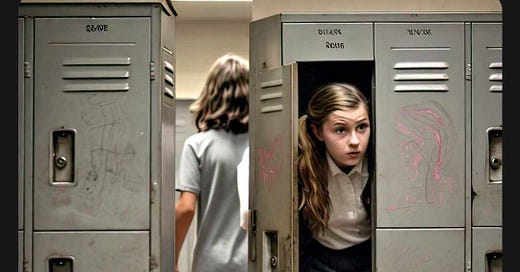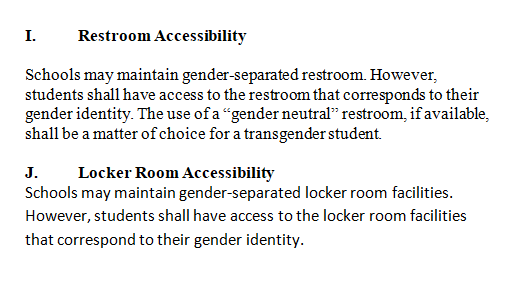Forced Exposure: The Invasion of Privacy in School Locker Rooms
Toms River ends Locker Room Issues
Big shoutout to the parents and Board of Education of Toms River for teaming up to create a groundbreaking new school policy that makes changing for gym optional! This is a huge win for student comfort and privacy!
Changing in front of your peers is such an outdated idea, it’s about time all New Jersey school boards follow Toms River’s lead and rethink this whole policy. Adolescence is already the most awkward, self-conscious time in life, so who thought it was a good idea to make kids strip down in front of each other? It’s especially tough for girls, who are usually trying to hide their awkwardly developing bodies, not put them on display. And now, with Policy 5756, they’ve got the added stress of worrying about biological boys being in the same space who also don’t want to change in the boy’s locker room. This whole situation needs a serious update.
Policy 5756
The optional Policy 5756 is known to undermine school transparency and student safety by permitting schools to conceal a child's gender identity transition from their parents and allowing biological males to access private areas designated for girls, compromising girls’ privacy and well-being. One easy solution to ease this problem is to stop forcing kids to change in front of each other.
Putting Girls in a Vulnerable Position
Many girls in NJ are uncomfortable with the idea of biological boys being allowed in our girls' locker room. It feels like an invasion of a girl’s private space. Schools have made alternative arrangements for transgender students by allowing them to change in private but the threat of being exposed to a boy is still a “threat” with policy 5756.
Locker rooms were always notoriously uncomfortable for girls, even if the room was filled with the same sex. The Girl’s Locker Room is where awkward adolescence collides with fragile self-esteem, amplified by matrice-sized sanitary napkins easily revealed through thin cotton panties, conspicuous buds revealed while changing your shirt, sudden sprouting body hair displayed, and overall self-consciousness about their all-too-new developing body shape. For younger girls, the pressure to conform to beauty standards is intense, with razor burn and body hair still taboo topics. The intimate setting forces girls to reveal aspects of themselves they may not be ready to share, from unshaven legs to burgeoning curves. Body comparisons and snide comments can make this space even more vulnerable.
Locker Rooms- Where Bullying Happens
To make matters worse, research indicates that locker rooms can be a high-risk area for bullying for both boys and girls. The statistics say:
22-34% of students report experiencing bullying in physical education classes or locker rooms (National Association of School Psychologists, 2019; Journal of Adolescent Health, 2020)
1 in 5 students experience bullying in locker rooms or gym class (Pacer's National Bullying Prevention Center)
40% of students feel uncomfortable changing in front of peers (Journal of Adolescent Research, 2018)
In 2024, why are students forced to expose themselves in front of their peers?
Physical fitness was heavily stressed in the late 19th and early 20th centuries as part of a broader movement toward improving public health and well-being. During this time, there was a growing recognition of the importance of physical activity, not just for athletic performance, but for overall health. US Schools began incorporating physical education into their curriculums, with an emphasis on building strength, endurance, and discipline. This era also saw the rise of organized sports and fitness programs, influenced by ideas from the military and the increasing focus on hygiene and physical health. The growing industrialization and urbanization of society, along with concerns about public health, made physical fitness a key part of education and public life. This increased health and hygiene awareness emphasized the importance of showering (which, let’s be honest, schools don’t bother with anymore) and wearing clean clothing after physical activity.
Fast forward to today, and gym classes are practically useless. Schools have utterly failed to teach kids how to exercise on their own, as blatantly obvious as the obesity epidemic waddling right past us. To make it worse, today’s gym classes are a joke with softball tosses and casual strolls around the gym so no one gets too stinky or sweaty. With barely any time in the schedule and programs that lack intensity or focus on building real fitness habits, it’s no surprise they do little to teach kids how to stay healthy. Meanwhile, kids are glued to screens, dodging physical activity like it’s homework, and chowing down on processed junk and sugary drinks. School gym programs are about as effective at fighting obesity as using a super soaker to put-out a wildfire.
A Winning Policy for Parents and Students
The locker room issue surfaced several months ago when parents and students voiced concerns at a Board of Education meeting about their intermediate school girls being in a locker room with a biological boy. In response, efforts were made to quickly develop a safe and effective way for girls and boys to avoid the locker room without penalty. Under the new policy, the previous rule of assigning a zero for not changing is no longer in effect. This approach addresses bullying, transgender issues, and the discomfort some students feel about changing in public, regardless of age. The board members stated that this new policy respected all the kid’s right to privacy.
At the end of the day, it is about the right to privacy. Having tweens and teens disrobe in front of peers is a huge invasion of privacy. NO ONE needs to witness a kid’s awkwardly developing body during one of the most self-conscious stages of their life. No kid asks to be put on display while trying to figure out how to manage puberty. It’s not just about keeping your clothes on—it's about maintaining some control over your own personal space. So yeah, forcing kids to change in front of each other? Definitely not respecting their right to privacy.






